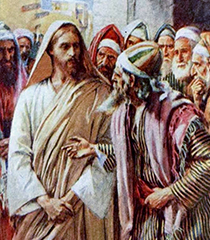Breaking Social Barriers
Cultural Context: Jews typically avoided Samaria, and men did not openly speak to women in public. Jesus' request for a drink breaks these societal norms.
John 4:9 (NIV):
"The Samaritan woman said to him, 'You are a Jew and I am a Samaritan woman. How can you ask me for a drink?' (For Jews do not associate with Samaritans.)"
Offering Living Water
Jesus responds by speaking of "living water," indicating a deeper spiritual meaning.
John 4:10 (NIV):
"Jesus answered her, 'If you knew the gift of God and who it is that asks you for a drink, you would have asked him and he would have given you living water.'"
The Woman's Confusion
The woman misunderstands, thinking Jesus refers to physical water.
John 4:11-12 (NIV):
"'Sir,' the woman said, 'you have nothing to draw with and the well is deep. Where can you get this living water? Are you greater than our father Jacob, who gave us the well and drank from it himself, as did also his sons and his livestock?'"
The Nature of Living Water
Jesus explains that the water He offers satisfies spiritual thirst.
John 4:13-14 (NIV):
"Jesus answered, 'Everyone who drinks this water will be thirsty again, but whoever drinks the water I give them will never thirst. Indeed, the water I give them will become in them a spring of water welling up to eternal life.'"
The Woman's Desire for This Water
Intrigued, the woman asks for this water.
John 4:15 (NIV):
"'Sir,' the woman said, 'give me this water so that I won't get thirsty and have to keep coming here to draw water.'"
Jesus Reveals Her Past
To deepen the conversation, Jesus reveals knowledge about her personal life.
John 4:16-18 (NIV):
"'He told her, 'Go, call your husband and come back.' 'I have no husband,' she replied. Jesus said to her, 'You are right when you say you have no husband. The fact is, you have had five husbands, and the man you now have is not your husband. What you have just said is quite true.'"
The Woman's Reaction
Surprised by His insight, the woman acknowledges Jesus as a prophet.
John 4:19-20 (NIV):
"'Sir,' the woman said, 'I can see that you are a prophet. Our ancestors worshiped on this mountain, but you Jews claim that the place where we must worship is in Jerusalem.'"
The True Nature of Worship
Jesus responds by teaching her about the essence of true worship.
John 4:21-24 (NIV):
"'Woman,' Jesus replied, 'believe me, a time is coming when you will worship the Father neither on this mountain nor in Jerusalem. You Samaritans worship what you do not know; we worship what we do know, for salvation is from the Jews. Yet a time is coming and has now come when the true worshipers will worship the Father in the Spirit and in truth, for they are the kind of worshipers the Father seeks. God is spirit, and his worshipers must worship in the Spirit and in truth.'"
The Revelation of His Identity
The woman expresses her belief in the coming Messiah.
John 4:25-26 (NIV):
"'The woman said, 'I know that Messiah' (called Christ) 'is coming. When he comes, he will explain everything to us.' Then Jesus declared, 'I, the one speaking to you—I am he.'"
Impact of the Encounter
The woman leaves her water jar and goes back to her town to tell others about Jesus.
John 4:28-30 (NIV):
"Then, leaving her water jar, the woman went back to the town and said to the people, 'Come, see a man who told me everything I ever did. Could this be the Messiah?' They came out of the town and made their way toward him."
Conclusion
This encounter not only breaks societal barriers but also highlights the inclusive nature of Jesus' message. The woman’s transformation leads many in her town to believe in Jesus as the Messiah.
Key Themes
Inclusivity: Jesus reaches out to those marginalized by society, including Samaritans and women.
Spiritual Thirst: The concept of "living water" signifies the fulfillment found in a relationship with God.
True Worship: Worship transcends location and rituals; it's about the heart and spirit.
This story beautifully illustrates the transformative power of Jesus' love and the invitation to all people to partake in spiritual life.
 Shop
Shop Info
Info Words
Words World
World
















